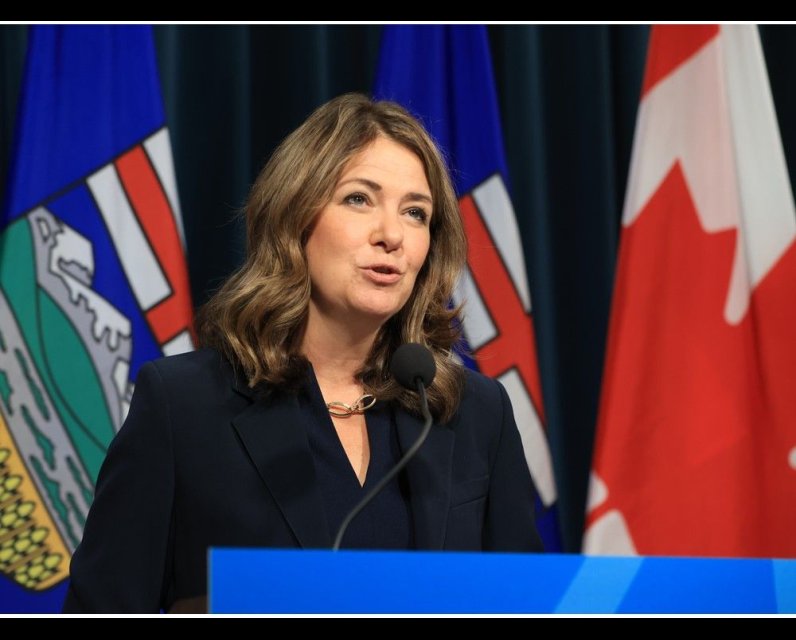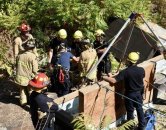Source Feed: National Post
Author: Donna Kennedy-Glans
Publication Date: September 13, 2025 - 09:07
The moment Mark Carney won over Danielle Smith (for now)
September 13, 2025

Canada is unapologetically back in the resource extraction business. For Alberta Premier Danielle Smith, that’s great news.
When you look at the nation-building projects announced by Prime Minister Mark Carney this week, Premier Smith said in a Friday night interview, the “mines for gold and copper, the nuclear power installation, LNG Canada 2 — these are true resource extraction, revenue-generating projects.”
“It’s about generating revenue,” she enthuses. “This isn’t supposed to be an exercise in how do we spend more government money on public infrastructure,” she says, “It’s how do we create an environment so that the private sector will build resource projects and revenue-generating projects so that we can afford to pay for the public infrastructure.”
And getting a bitumen pipeline built can help pay the bills, she suggests, including the cost to decarbonize the oil that flows in that pipeline. “You have to have new revenue in order to pay for new spending,” she reasons, quite unlike “the model that Justin Trudeau put on the table which was nothing but cost and no benefits, all shut in and no expansion.”
This is the way she sees it: The carbon capture and storage network and pipeline proposed by the Pathways Alliance, a coalition of oilsands producers, “is going to cost somewhere between $10 to $20 billion.” Expensive, yes, “but if we get a new million barrel per day bitumen pipeline, that generates $20 billion per year in revenue, and if you are able then to have that operate year after year after year,” she emphasizes, “now you have a revenue stream to be able to offset whatever the cost will be of developing a new technology to decarbonize.”
Figuring out who pays to decarbonize the bitumen is a negotiation in progress, the premier acknowledges, but she doesn’t think it needs to hold up pipeline construction. “Honestly,” she says, “I think, really, if you want the truth, both of us (the province and Ottawa) are committed.”
“We benefit almost equally from new barrels getting to the market,” the premier reports; the feds earn corporate and personal incomes taxes, and the province earns royalties. “We’re all committed to doing it,” she posits, “the bigger issue is none of this can be paid for if we don’t have new production and new revenue.”
To shed a little light on the tone of her meeting this week with the prime minister, the premier shares a snippet of that exchange: “I said to him, ‘Guess what we’re looking for is a compromise.’ And he said, ‘I’m not. I’m looking for a win-win.’” She continues: “I just thought, ‘You know what? That’s the right attitude.’ He doesn’t want a win-lose. He doesn’t want a lose-lose. He wants a win-win.”
There has been so much bad-blood between Alberta and Ottawa, I find myself listening closely to the tenor of the premier’s voice, to gauge if her optimism is genuine.
While I recognize her unrelenting rallying cry — “We can get new production. We can get achievable emissions reduction targets. We can expand our influence, not only economically, but from a security point of view, globally” — I also want assurance this Carney-led resource extraction momentum is for real.
So I poke back. How is any of this grand strategy viable with an emissions cap in place? No pipeline company or energy producer is going to invest with a federal-government imposed ceiling on oil production.
“Not a lot of folks understand how pipelines get built,” Smith readily agrees. “How pipelines get built is companies go around to people who take oil out of the ground and say, ‘Hey, are you willing to pledge some barrels for this pipeline so I can go to the bank and get financing?’” An emissions cap means oil producers aren’t prepared to make those pledges.
“I know the prime minister wants to ensure that the Pathways project goes ahead, so there’s lower carbon emissions, but in order to be able to pay for that, you need to have new production, and to have new production, you’ve got to get rid of the bad laws,” she says, reiterating her wish-list for Ottawa.
“You’ve got to get rid of emissions caps, you’ve got to get rid of the greenwashing law, you’ve got to get rid of the tanker ban, and then all of those things will allow a pipeline company to go to those same producers and say, ‘Do you want to pledge some barrels?’ and they’ll say ‘yes.’”
While the premier isn’t saying she’s been told the emissions cap will go the way of the carbon tax — and other Justin Trudeau-era greening aspirations — she says, the prime minister “seems to signal that he is prepared to do that.”
Premier Smith sees opportunity for exports of Canada’s oil, in all directions. “If I had my druthers,” she says, “I’d have a million barrel a day pipeline going to Churchill, a million barrel a day pipeline going to the West Coast, and two million barrels a day going down to the U.S., because I want to double production.”
Even the International Energy Agency has realized they must modify their expectations for future oil demand “based on reality, rather than hopes and wishes,” she confidently reports, and points to OPEC’s latest forecasts for global oil consumption (123 million barrels per day by 2050). Given those outlooks, she predicts, ”there’s room for another 2 or 3 or 4 billion barrels per day of Canadian oil.”
“You’ve even got Europe saying, yes, there’s a market; we would like to buy more Canadian energy. We’ve already seen with TransMountain and the Coastal gas link and LNG Canada opening up; the Asian markets want us as well. And the Americans too have said they’d like to do a reboot on the Keystone XL concept.”
“With all of our friends and allies and neighbours saying, ‘Please, help us, so that we don’t have to rely on despotic regimes,’ how can we say no to that?” she rhetorically asks.
The premier’s enthusiasm is unbridled, but where’s her ubiquitous sense of urgency? Could she really be as sanguine as she sounds? Prime Minister Carney has hinted he’d like to see all the premiers gather in Winnipeg for the Grey Cup in November, she says, that’s when the second tranche of nation-building projects is to be revealed.
“My urgency is still there,” she admits. “I’m going to the ADIPEC Conference in Abu Dhabi in November, and it sure would be nice for me to have a platform there, to say Canada’s open for business again.” Before that, she’s got a Throne Speech to deliver in the Alberta Legislature. “It would be nice for the prime minister and I to have a joint announcement,” she hints, “well before the end of the year.”
And there’s that niggling risk of a referendum vote, if the petition initiated by former Alberta deputy premier Thomas Lukaszuk is successful. “He’s crafting his vote: Do you want to remain in Canada?” she explains. “But those are yes/no votes. So what’s the consequence if people are disgruntled and disenfranchised? He gets the signatures; and then people have the choice of voting yes or no.”
“Anytime you get an issue like that on the table, it could go either way, especially when emotions run high,” Smith cautions. “So I’m aware of the urgency. I have told the prime minister that Justin Trudeau created the separatist movement, and I think he (Carney) can take the air out of it, but we have to see action.”
If Lukaszuk’s petition is successful, Smith says the province will have a vote in the spring. “It would be far better for us to have demonstrated some real progress,” she suggests, “so people can feel confident in the relationship that Canada and Alberta have.”
Our website is the place for the latest breaking news, exclusive scoops, longreads and provocative commentary. Please bookmark nationalpost.com and sign up for our newsletters here.
A couple who lost everything when their newly-renovated home was destroyed in the Long Lake wildfire is celebrating a new beginning with the arrival of their baby.
September 13, 2025 - 10:33 | Heidi Petracek | Global News - Canada
Ottawa first responders teamed up Friday to rescue an injured construction worker who had fallen about three metres into a utility tunnel in the city’s south end. Read More
September 13, 2025 - 10:07 | Norman Provencher | Ottawa Citizen
Remembered by colleagues and friends as generous, humble, mischievous and a great cook, Graham Greene was, above all, a versatile actor whose career spanned half a century and broke down racial stereotypes of Indigenous people as violent aggressors or victims. Probably best known for his role as Kicking Bird, a Sioux tribal leader in Kevin Costner’s 1990 epic film Dances with Wolves, Mr. Greene was a trailblazer in presenting Indigenous characters with human complexity and depth.
September 13, 2025 - 10:00 | Sue Montgomery | The Globe and Mail



Comments
Be the first to comment